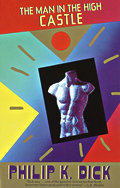
| Publisher: | Vintage |
| Copyright: | 1962 |
| Printing: | July 1992 |
| ISBN: | 0-679-74067-8 |
| Format: | Trade paperback |
| Pages: | 259 |
Today, the shelves are filled with alternative history stories. One can read about what might have happened if the US South had won the Civil War, if this or that historic figure had died or lived longer, and, of course, if the Axis powers had won World War II. It's become a sub-genre of its own.
This wasn't the case in 1962, and while there were alternative history stories before The Man in the High Castle, the grown of alternative history as a genre is sometimes attributed to this book. And, unlike many "early use of the idea" books, it's also well-written, despite the lack of a clear conclusion. This is neither a political thriller nor an exploration of history (Dick never dives deeper than the knowledge of a casual history buff), but more of a meander through the philosophy and psychology of occupation and reality from the perspective of several inhabitants of the Japanese-controlled Pacific States and the semi-independent midwest.
It's hard to write a book about victorious Nazis without quickly losing the story under the weight of atrocities and political insanity. Dick sidesteps this by opening the book in the Japanese-controlled portions of the US, painting a quiet if disturbing picture of life under a more reasonable occupation, and then introducing the Nazis in small doses or as background. The result leaves the reader disliking the Japanese for what they've changed and broken but still favoring them over the insanity of the Nazis, with the exact details of that insanity more implied or referenced than shown so that they don't consume the book.
What does drive the book is the I Ching, the ancient Chinese book of philosophy that is often used for divination. Dick said he used the I Ching himself to decide major plot elements of the book (and claims the lack of a clear ending was due to no clear I Ching guidance at the end of the story), and nearly every character in the story consults it frequently, the hexagrams foreshadowing what is to come. For someone who hasn't previously been exposed to the I Ching other than in passing, this was interesting in its own right, but it also drives home the influence that the occupying Japanese have on US culture (in a fascinating analogue to the US influence on Japan after WW2 in our world). They infuse it not only with their standards of politeness and business culture, but also with a very different form of mysticism, acceptance, and sense of the momentum of events. The key lesson of the I Ching in this book seems to be that one has to go with the flow of events, and that one can only influence the outcome within the limits of what the situation is prepared to accept.
Also playing a significant role in the book is an interesting bit of layered fiction, a what-if novel within the novel entitled The Grasshopper Lies Heavy that tells of a world in which the Allies won the war. The world in this fictional novel is still not our world, extrapolating some things poorly and making the sort of funny mistakes that one expects any alternate history would make, making puzzling out the problems with it a fun sub-plot of its own. The author is said to live in a survivalist's retreat high in the mountains, protected by barbed wire and weapons. One character makes her way across the middle of the country determined to meet him, with ambiguous results that form the clearest conclusion of the book.
Other than that thread, which turns out to be less central than it may sound at first, Dick mostly sets up his characters against this background and then lets them wander. There are recurring themes: pride in culture, questions of what is real and what isn't, appearances and deception, and personal redemption. There are miniature plots, interwoven to a degree, each a compelling short story in its own right. What there isn't is a true conclusion, and the reader is left hanging wondering what's going to happen in the larger world. Some characters make it out of smaller dangers, but large dangers still loom on the horizon. The book left me with an unsettled feeling.
This is not a traditional novel with a climax and a denouement. The world isn't fixed at the end. It is, however, extremely readable for a philosophical exploration, with well-drawn, complex characters and solid dialogue. Dick employs a clipped sentence construction in many of the wanders through his characters' thoughts, one that I think is intended to mimic some of the properties of Japanese-accented English (particularly by dropping articles), but if anything it makes the book more readable. I was very impressed with his writing skill.
I can only recommend this one provisionally, as one has to be willing to tolerate a fair bit of ambiguity and a story that drifts off at the end. I found it very thought-provoking, though.
Reviewed: 2005-07-24